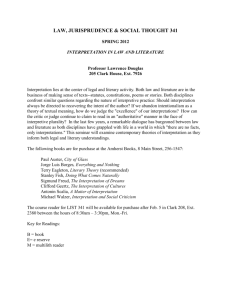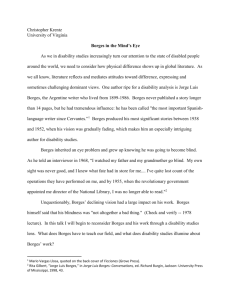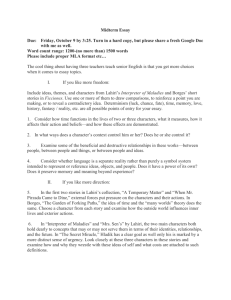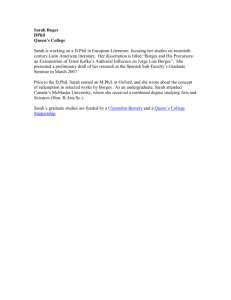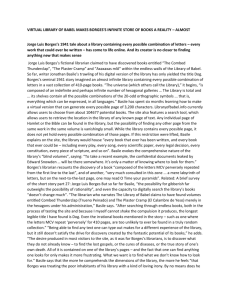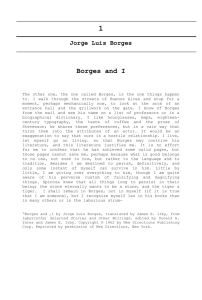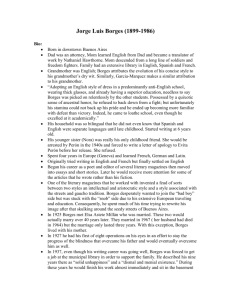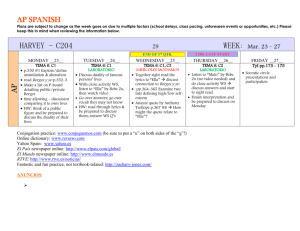Jorge Luis Borges (1899-1986)
advertisement
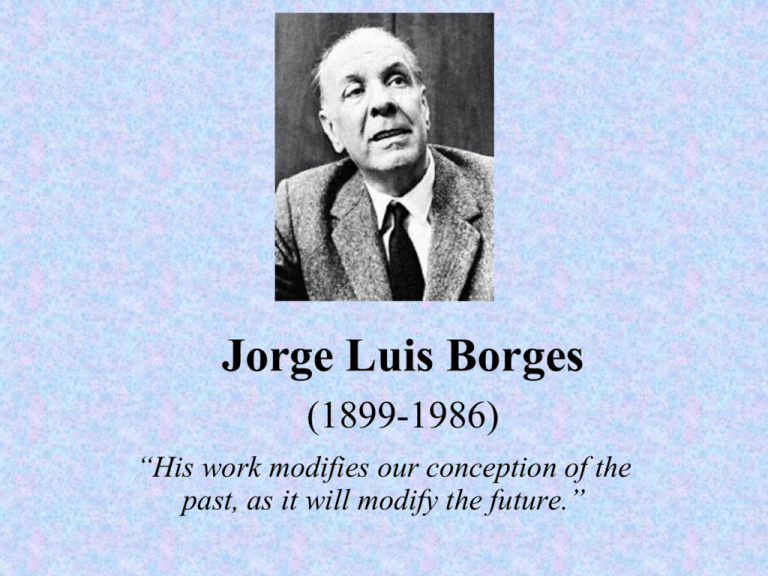
Jorge Luis Borges (1899-1986) “His work modifies our conception of the past, as it will modify the future.” Argentina A Quick Overview • Jorge Luis Borges (August 24, 1899 – June 14, 1986) was an Argentine writer who is considered one of the foremost literary figures of the 20th century. • Best-known in the English speaking world for his short stories and fictive essays, Borges was also a poet, critic, translator and man of letters. • He was influenced by authors such as Dante Alighieri, Miguel de Cervantes, Franz Kafka, H.G. Wells, Rudyard Kipling and G. K. Chesterton. Magical Realism • Fantastic elements, which may be intrinsically plausible but are never explained. • Characters accept rather than question the logic of the magical element. • Exhibits a richness of sensory details. • Uses symbols, runes and imagery extensively. • Emotions and human sexuality as a social construct are often developed in great detail. • Distorts time so that it is cyclical or so that it appears absent. Another technique is to collapse time in order to create a setting in which the present repeats or resembles the past. • Inverts cause and effect, for instance a character may suffer before a tragedy occurs. • Incorporates legend or folklore. • Presents events from multiple standpoints - ie. alternates detached with involved narrative voice; likewise, often shifts between characters' viewpoints and internal narration on shared relationships or memories. • Mirrors past against present; astral against physical planes; or characters one against another. • Open-ended conclusion leaves the reader to determine whether the magical and/or the mundane rendering of the plot is more truthful or in accord with the world as it is. • Owns differing properties of magic and realism at the same time, while incorporating the two together often seamlessly. Interesting Quotes • "The earth we inhabit is an error, an incompetent parody. Mirrors and paternity are abominable because they multiply and affirm it." — (dogma of a fictional religion in "Hakim, the masked dyer of Merv". Part of this quote is also attributed to a heresiarch of Uqbar in "Tlön, Uqbar, Orbis Tertius".) • "The central fact of my life has been the existence of words and the possibility of weaving those words into poetry." • "I do not write for a select minority, which means nothing to me, nor for that adulated platonic entity known as 'The Masses'. Both abstractions, so dear to the demagogue, I disbelieve in. I write for myself and for my friends, and I write to ease the passing of time." — Introduction to The Book of Sand • "When the end draws near, there no longer remain any remembered images; only words remain. It is not strange that time should have confused the words that once represented me with those that were symbols of the fate of he who accompanied me for so many centuries. I have been Homer; shortly, I shall be On One, like Ulysses; shortly, I shall be all men; I shall be dead." (from 'The Immortal') • "I have always imagined that paradise will be a kind of library." • "A librarian wearing dark glasses asked him: 'What are you looking for?' Hladik answered: 'I am looking for God.' The librarian said to him: 'God is in one of the letters on one of the pages of one of the four hundred thousand volumes of the Clementine. My fathers and the fathers of my fathers have searched for this letter; I have grown blind seeking it.'" (from 'The Secret Miracle') • Borges's fictional universe was born from his vast and esoteric readings in literature, philosophy, and theology. • He sees man's search for meaning in an infinite universe as a fruitless effort. In the universe of energy, mass, and speed of light, Borges considers the central riddle time, not space. "He believed in an infinite series of times, in a growing, dizzying net of divergent, convergent and parallel times. • This network of times which approached one another, forked, broke off, or were unaware of one another for centuries, embraces all possibilities of time." • The theological speculations of Gnosticism and the Cabala gave ideas for many of his plots. The Labyrinth Borges has told in an interview that when he was a boy, he found an engraving of the seven wonders of the world, one of which portrayed a circular labyrinth. It frightened him and the maze has been one of his recurrent nightmares. "Almost instantly, I understood: 'The garden of forking paths' was the chaotic novel; the phrase 'the various futures (not to all)' suggested to me the forking in time, not in space. A broad rereading of the work confirmed the theory. In all fictional works, each time a man is confronted with several alternatives, he chooses one and eliminates the others; in the fiction of Ts'ui Pên, he chooses simultaneously - all of them. He creates, in this way, diverse futures, diverse time which themselves also proliferate and fork." (from 'The Garden of Forking Paths') The Mirror • Another recurrent image is the mirror, which reflects different identities. The idea for the short story 'Borges y yo' was came from the double, who was looking at him - the alter ego, the other I. • There is a well-known man, who writes his stories, a name in some biographical dictionary, and the real person. "So my life is a pointcounterpoint, a kind of fugue, and a falling away - and everything winds up being lost to me, and everything falls into oblivion, or into the hands of the other man." The Falseness of Reality • Influenced by the English philosopher George Berkeley (1685-1753), Borges played with the idea that concrete reality may consist only of mental perceptions. • The "real world" is only one possible in the infinite series of realities. These themes were examined among others in the classical short stories – 'The Garden of Forking Paths' – 'Death and the Compass', • Borges showed his fondness of detective formula. In the story the calm, rational detective and adventurer Erik Lönnrot (referring to the philologist/poet Elias Lönnrot, 1802-1884, the collector of Kalevala poems) finds himself trapped in cryptographic labyrinths in a fantastical city, while attempting to solve a series of crimes. • However, Borges's Lönnrot has more in common with C. Auguste Dupin, Sherlock Holmes and Father Brown and their amazing powers of deduction than with the Finnish namesake, who traveled in the northwest Russia to collected ancient poems. “The Garden of Many Paths” Some Unpublished Borgesian photos by Sean Kernan. Cites Cited • Borges: Garden of Forking Paths - Author Homepage. http://www.themodernword.com/borges/ • “Jorge Luis Borges” Wikipedia, the Free Encyclopedia. http://en.wikipedia.org/wiki/Jorge_Luis_Borges • “Jorge Luis Borges.” Books and Writers. http://www.kirjasto.sci.fi/jlborges.htm • “The Dream of the Blind Librarian” Flickr http://www.flickr.com/photos/magic_fly/180082 • Molins, Philippe dir. Written by Alberto Manguel. Jorge Luis Borges: The Mirror Man. Web 10 May 2010. http://www.youtube.com/watch?v=vVCAjzn4 BEI
